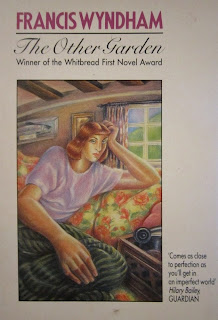I picked up The Other Garden (1987) by Francis Wyndham because I thought I'd heard of the author (and because it was short, cheap, and sounded interesting) but I must have been thinking of someone else, since this seems to have been Wyndham's only novel, although he also wrote (writes?) short stories. It won the Whitbread First Novel Award, and various luminaries are printed on the cover saying that it 'Comes as close to perfection as you'll get in an imperfect world' (Hilary Bailey); 'Perfectly judged... wry, exact, poised' (Harold Pinter); 'A completely faultless piece of writing' (Susan Hill). Well... it left me a little nonplussed. Yes, this is going to be one of those rather uninspiring reviews where I am forced to say "It's fine, but that's about it."
I was, though, rather struck by the opening:
"How soon will lunch be ready?" my father would ask. Assuming that hunger had made him impatient, my mother would answer with eager apology, "Oh, any minute now - it must be nearly one." But she had misinterpreted him. He had really wanted to know if he still had time for a further look at the other garden before sitting down to the meal. In dismay, she would watch him put on an old grey trilby hat, choose a stick, pass purposefully through the front entrance, then walk serenely down the short drive and vanish into the open road. Almost immediately opposite, a painted white wooden door in a red brick wall admitted him to this beloved extension of his property, subtly but certainly separate from the house and its bland surrounding lawns. Once in the other garden he was safely out of earshot - but a few minutes later I would be sent in search of him with a summons to return, the serving of our good having been innocently hastened by his ambiguous question when what he had hoped for was delay.This opening paragraph, and the title of the novel (novella? It's super short) led me to think that The Other Garden might, indeed, be about this other garden. Well, perhaps it was a metaphor for something (give me a moment) because it only turned up at the beginning and the end. In between, it focuses mainly on the Demarest family, acquaintances of the narrator's family, albeit rather more well-to-do. Kay and Sandy are the children, Sybil and Charlie are the Demarest parents. The narrator (who may or may not be named) is focused chiefly on Kay, a young woman who is rather captivating and wilful.
And... I don't think I can remember much else. There is a sweet dog at one point. And Denis (a rather eccentric schoolfriend of the narrator) is shipped off to Switzerland for TB treatment. He's odd. What else? Oh dear, oh dear. I only read it recently, and all the details have faded. It was that sort of book. If I weren't recording all my books for A Century of Books, I'd have quietly slipped this back on the shelf, and never mentioned it... But I did jot down one quotation which I liked. Sybil generally isn't a very sympathetic character, but I think a lot of us would raise a glass to this:
"I do believe," Sybil continued, "that when the history books come to be written it will emerge that the great unsung heroine of these times we're living through will be none other than that much maligned creature, the British Housewife! I'm thinking, in fact, of writing a letter to the Daily Telegraph to propose that some promising young sculptor - or perhaps a sculptress would be a better choice - should be officially commissioned to design a statue in her honour, and that the result should be prominently erected in some public place. I don't know about you, but I for one am getting sick and tired of looking at monuments portraying middle-aged men on horseback!"The details of The Other Garden escape me, but I do remember the effect it had upon me. It's no secret that I love short books, and I really admire authors who can use 100-200 pages effectively. But a novella demands its own structure. The 'rules' for that aren't obvious - indeed, they don't exist, do they? - but I don't think a novella should be simply a truncated novel. It felt like Wyndham's training at the short story had made him unable to structure a whole novel - I don't know, it just felt incomplete. Not terminated too early, but as though it were the skeleton of a different, longer novel. Somehow not satisfying. Hmm. My post started fairly vaguely, and it'll end inconclusively. It's probably a warning sign that, a week or two after I finished The Other Garden, I don't really remember anything about it. But... don't forget that Hilary Bailey things it 'comes as close to perfection as you'll get in an imperfect world.' So what do I know?


No comments:
Post a Comment
I've now moved to www.stuckinabook.com, and all my old posts are over there too - do come and say hello :)
I probably won't see your comment here, I'm afraid, but all my archive posts can also be found at www.stuckinabook.com.